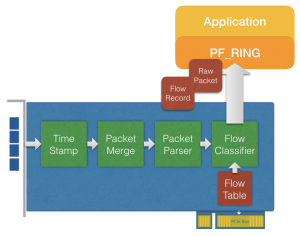This is to announce a new PF_RING major release 7.0.
In addition to many improvements to the capture modules, drivers upgrades, containers isolation,
the main change of this release is the ability to offload flow processing to the network card (when supported by the underlying hw).
Flow offload is a great feature for cutting the CPU load when using applications doing intensive flow processing, as it’s possible to let the network card handle activities like flow classification (update flow statistics) and shunting (discard or bypass flows according to the application verdict). This saves CPU for further processing (e.g. DPI), or for running multiple applications on the same box (Netflow probe and traffic recording, or IDS). Enabling flow offload it is possible to receive from the capture stream both raw packets (with metadata including the flow ID) and flow records (in the form of periodic flow stats updates), and it is possible to shunt a specific flow providing the flow ID.
Flow offload is currently supported by 10/40G Accolade Technology adapters of the ANIC-Ku Series (tested on ANIC-20/40Ku, ANIC-80Ku), however PF_RING provides a generic API that is hardware agnostic, as always.
Soon we will post news on how to accelerate applications by leveraging on flow offload. This not only reduces the CPU load but it opens up to many new opportunities as combining on the same box flow-based analysis and packet-to-disk. For those who will attend Suricon 2017, you can hear how Suricata benefits from this new technology to move this IDS to 40/100 Gbit.
This is the complete changelog of the 7.0 release:
- PF_RING Library
- Flow offload support
- New PF_RING_FLOW_OFFLOAD pfring_open() flag to enable hw flow offload on supported cards (received buffers are native metadata)
- New PF_RING_FLOW_OFFLOAD_NOUPDATES pfring_open() flag to disable flow updates with hw flow offload enabled: only standard raw packets with a flow id are received
- New PKT_FLAGS_FLOW_OFFLOAD_UPDATE packet flag to indicate flow metadata in the received buffer (generic_flow_update struct)
- New PKT_FLAGS_FLOW_OFFLOAD_PACKET packet flag to indicate raw packet with flow_id in pkt_hash
- New PKT_FLAGS_FLOW_OFFLOAD_MARKER packet flag to indicate marked raw packet
- Fixes for ARM systems
- ZC Library
- New pfring_zc_set_app_name API
- PF_RING_ZC_PKT_FLAGS_FLOW_OFFLOAD flag to enable hw flow offload
- Fixed BPF filters in SPSC queues
- Fixed hugepages cleanup in case of application dropping privileges
- Fixed sigbus error on hugepages allocation failure on numa systems
- Fixed multiple clusters allocation in a single process
- PF_RING-aware Libpcap/Tcpdump
- Libpcap update v.1.8.1
- Tcpdump update v.4.9.2
- PF_RING Kernel Module
- Docker/containers namespaces isolation support
- Fixed capture on Raspberry Pi
- Implemented support for VLAN filtering based on interface name (., where ID = 0 accepts only untagged packets)
- New cluster types cluster_per_flow_ip_5_tuple/cluster_per_inner_flow_ip_5_tuple to balance 5 tuple with IP traffic, src/dst mac otherwise
- Fixed hash rule last match, new hash_filtering_rule_stats.inactivity stats
- PF_RING Capture Modules
- Accolade flow offload support
- New hw_filtering_rule type accolade_flow_filter_rule to discard or mark a flow
- Netcope support
- New hw_filtering_rule type netcope_flow_filter_rule to discard a flow
- Improved Fiberblaze support
- pfring_get_device_clock support
- Ability to set native filters by setting as BPF string ‘fbcard:’
- Fixed TX memory management
- Fixed subnet BPF filters
- Fixed drop counter
- Fixed capture mode
- Fixed sockets not enabled
- FPGA error detection
- Endace DAG update
- npcap/timeline module compressed pcap extraction fix
- Drivers
- ixgbe-zc driver update v.5.0.4
- i40e-zc driver update v.2.2.4
- nBPF
- Fixed nBPF parser memory leak
- Examples
- New pfsend option -L to forge VLAN IDs
- zbalance_ipc improvements
- Ability to dump output to log file (-l)
- Fixed privileges drop (-D)
- Misc
- Fixed systemd dependencies, renamed pfring.service to pf_ring.service
- New /etc/pf_ring/interfaces.conf configuration file for configuring management and capture interfaces

